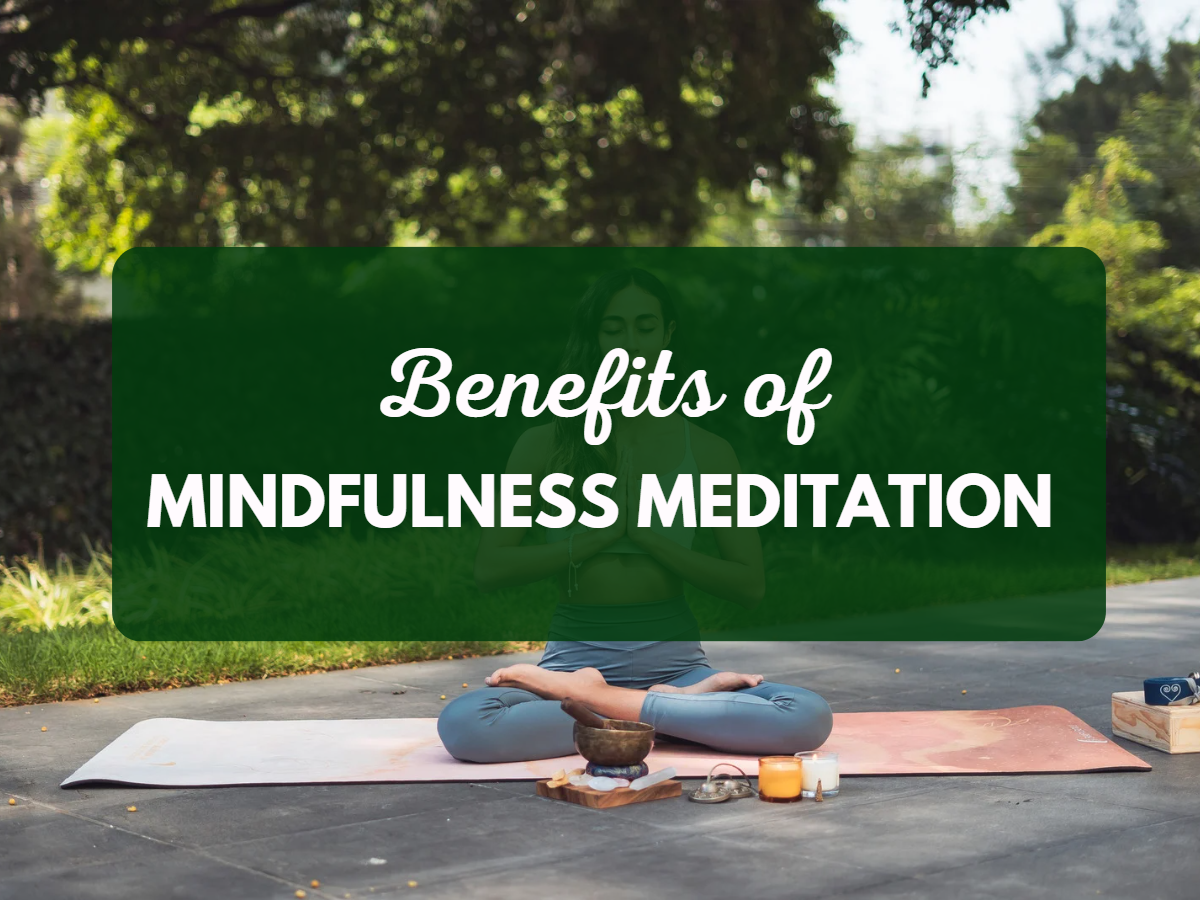24 Life-Changing Benefits of Mindfulness Meditation
As our lives become more hectic and overwhelming, taking a moment to breathe and center ourselves is extremely important. And that’s where mindfulness comes in.
Mindfulness has several benefits, making it an excellent tool to add to your wellness arsenal.
Let’s dive right in!
Overall Improvements
- Increased Self-Awareness: Mindfulness helps you tune in to your thoughts and emotions, giving you a better understanding of your own mind and behaviors.
- Enhanced Focus and Concentration: With a clearer mind, you can focus better on the task without being distracted by external stimuli.
- Improved Cognitive Functioning: Research has shown that mindfulness can enhance working memory and cognitive flexibility, allowing you to think clearly and make better decisions.
- Better Decision-Making Skills: When you’re more self-aware, focused, and cognitively sharp, it’s easier to make wise choices that align with your goals and values.
Mental Benefits
- Reduced Stress: Mindfulness can activate the parasympathetic nervous system, helping you relax and reduce stress levels.
- Improved Sleep Quality: By calming your mind and body, mindfulness can lead to better sleep, which is crucial for overall health and well-being.
- Reduced Symptoms of Anxiety and Depression: Studies have found that mindfulness can effectively reduce symptoms of anxiety and depression, providing a natural alternative to medication.
- Increased Emotional Regulation: By training your mind to observe your emotions without judgment, mindfulness can help you regulate your emotions more effectively, leading to greater emotional stability.

Emotional Benefits
In addition to improving mental health, mindfulness can also have a significant impact on emotional well-being. Here are some of the ways that mindfulness can help:
- Improved Emotional Well-being: Mindfulness can help cultivate a more positive perspective of life, leading to happiness and well-being.
- Reduced Emotional Reactivity: By practicing mindfulness, you can learn to observe your emotions without becoming overwhelmed, allowing you to respond to difficult situations more calmly and rationally.
- Increased Empathy and Compassion: Mindfulness can help you become more empathetic and compassionate toward others by training your mind to be more attentive.
- Improved Relationships: By cultivating greater empathy and compassion, as well as reducing emotional reactivity, mindfulness can lead to improved relationships with friends, family, and coworkers.
Physical Benefits
While many consider mindfulness a purely mental practice, it can also have significant physical benefits. Here are some of the ways that mindfulness can improve physical health:
- Reduced Chronic Pain: Studies have found that mindfulness can effectively reduce chronic pain, including conditions such as fibromyalgia and lower back pain.
- Improved Cardiovascular Health: Mindfulness has been shown to reduce blood pressure and improve cardiovascular health, reducing the risk of heart disease and stroke.
- Reduced Symptoms of Autoimmune Diseases: Research has found that mindfulness can help reduce symptoms of autoimmune diseases, including rheumatoid arthritis, multiple sclerosis, and lupus.
- Reduced chronic Inflammation: Chronic inflammation has been linked to many health problems, including heart disease, diabetes, and cancer. Mindfulness may reduce chronic inflammation in the body, potentially reducing the risk of these diseases.

In addition to the mental and physical benefits, mindfulness can have significant advantages in the workplace and social settings.
Workplace Benefits
- Improved Productivity: Mindfulness can help improve productivity by enhancing focus, reducing distractions, and promoting mental clarity. Studies have shown that even short meditation breaks can increase productivity and concentration.
- Reduced Burnout and Absenteeism: Work demands can often lead to burnout, causing employees to take time off or even quit their jobs. Mindfulness can help prevent burnout by reducing stress levels and increasing resilience.
- Improved Communication: Mindfulness can help improve communication by promoting active listening and reducing reactive responses. Mindful communication can lead to better collaboration and understanding, promoting a positive work environment.
- Enhanced Creativity and Innovation: By promoting mental clarity and reducing distractions, mindfulness can help enhance creativity and innovation. Mindful thinking can lead to new insights and perspectives and new ideas and solutions.
Social Benefits
- Increased Social Connectedness: Mindfulness can help improve social connectedness by promoting active listening and empathy. Mindful communication can lead to deeper connections and stronger relationships.
- Improved Communication and Listening Skills: Mindfulness can help improve communication and listening skills by reducing distractions and promoting active listening. Mindful communication can lead to better understanding and more meaningful conversations.
- Enhanced Empathy and Compassion: Mindfulness can help promote empathy and compassion by promoting a non-judgmental, compassionate mindset. Practicing mindfulness can lead to greater empathy and understanding for others.
- Reduced Aggression and Hostility: Mindfulness can help reduce aggression and hostility by promoting self-awareness and emotional regulation. Mindfulness can help people respond more calmly and compassionately to conflict.
Incorporating mindfulness into your daily routine can improve your mental health, physical health, relationships, and work performance.
If you’re new to mindfulness, many resources are available to help you get started.
Apps like myrelax.app, Headspace, and Calm offer guided meditations and other tools to help you practice mindfulness.
Additionally, many books and online courses can help you deepen your understanding of the practice.
Can mindfulness meditation help with weight loss?
Mindfulness meditation helps with weight loss: While mindfulness meditation is not a magic pill for weight loss, this can be a helpful tool in achieving sustainable weight loss.
Mindfulness meditation is a practice of being present at the moment, without judgment or distraction, which can help people better understand their relationship with food and their bodies. One way mindfulness meditation can help with weight loss is by increasing self-awareness.
People can better understand their eating habits and patterns by paying attention to thoughts and feelings related to food and eating.
This can lead to making healthier choices and reducing emotional eating.

Does meditation reverse aging?
Studies have shown that mindfulness meditation can have a positive impact on aging.
One study found that long-term meditation practice can slow down brain aging.
The study followed a group of long-term meditators and compared their brain age to a control group of non-meditators.
The results showed that the meditators had a brain age that was, on average, 8 years younger than their chronological age, while the control group had a brain age that was, on average, the same as their chronological age.
This study looks at the connection between mindfulness meditation and cellular aging. The study suggests that some types of meditation might help maintain telomere length, which can indicate cellular aging.
Telomeres are like little caps that protect the ends of chromosomes, and their length can give us an idea of how long cells and organisms might live.
Research has shown that telomere length is related to chronic stress and depression, meaning how we think and feel can affect how our cells age.
This study looks at two ways of thinking – threat and mindfulness – and how they affect cellular aging.
When we feel stressed and anxious, we tend to think about things negatively, which can keep us in a reactive state for a long time.
But mindfulness meditation can help shift our thoughts to a more positive and constructive place, reducing stress and making us feel more in control.
The study examines how telomere length is linked to stress and how our thoughts affect telomere length.
The authors suggest that meditation, especially mindfulness meditation, can help maintain telomere length by reducing stress and increasing positive thoughts and feelings.
Overall, the study suggests that mindfulness meditation might be a helpful tool in fighting cellular aging by reducing stress and promoting positive thoughts and feelings. Ongoing research will help us understand the connection between mindfulness meditation and aging.
In addition to these scientific studies, many experts recommend mindfulness meditation as a beneficial practice.

Did you know that meditation can be helpful for students?
Here is how:
Is meditation helpful for students?
A recent study looked at sixth graders in a Boston school and found that mindfulness education teaches techniques to calm the mind and body.
It can reduce stress’s negative effects, help students stay focused academically, and avoid behavior problems.
The study showed that students who took part in an eight-week mindfulness program were less stressed out than their classmates who didn’t.
They were also better at controlling their emotions and staying focused. The program taught them techniques like focusing on a rock for a minute, noticing when their minds wandered, and then refocusing on it.
The study adds to other research about mindfulness in the classroom. By reducing anxiety and helping students manage their emotions, mindfulness education can help them face behavioral and academic challenges. And the evidence suggests that it could be particularly helpful for students dealing with trauma and other stressful situations.
So if you’re a student, why not try mindfulness techniques yourself? It could help you stay calm and focused during those tough school days!
Key Takeaway:
Mindfulness is a powerful tool that can enhance many aspects of your life. Whether you want to reduce stress, improve your sleep, or become more self-aware, mindfulness can help you achieve your goals. So why not give it a try? Your mind and body will thank you.
If you want to explore mindfulness more, check out this link for resources to help you get started.



